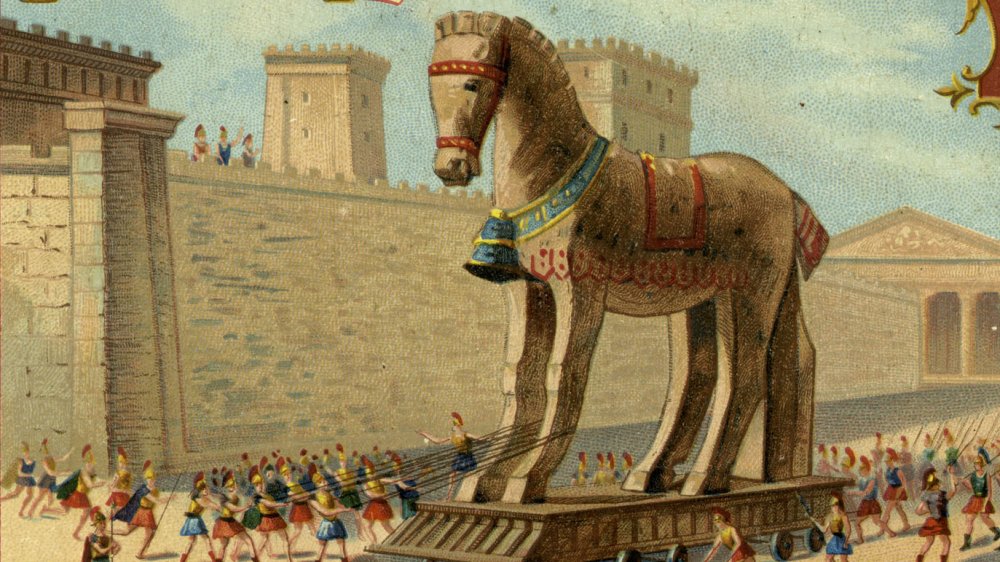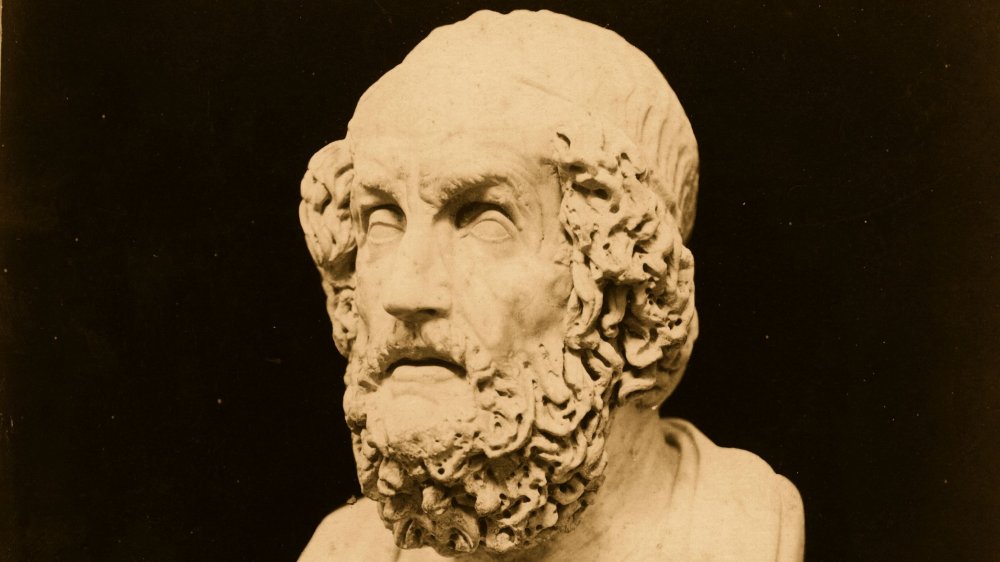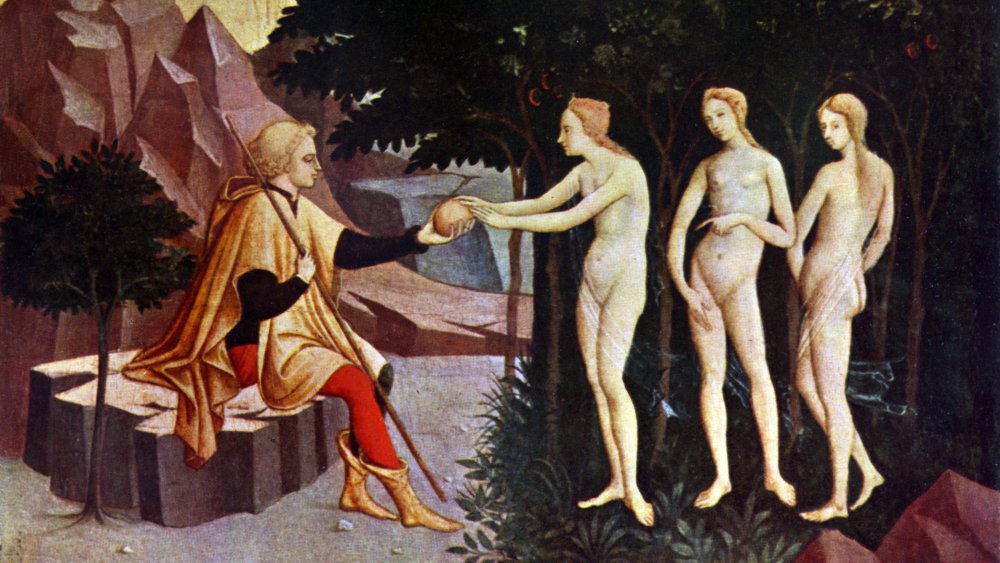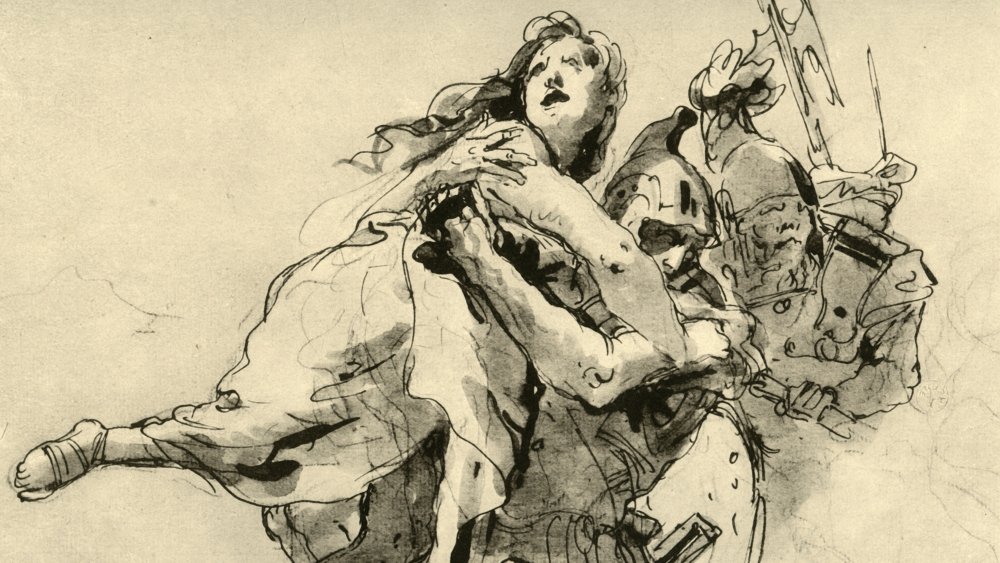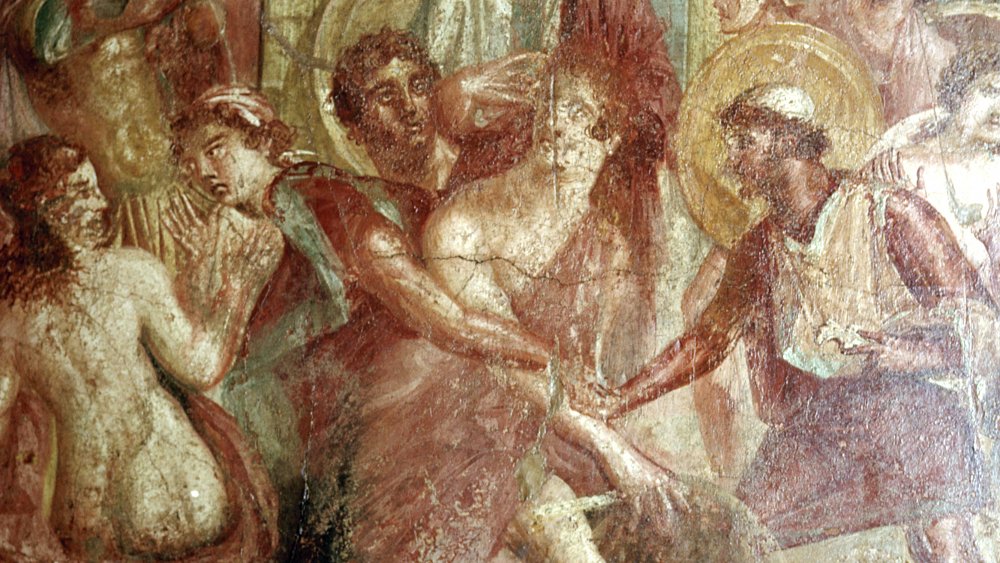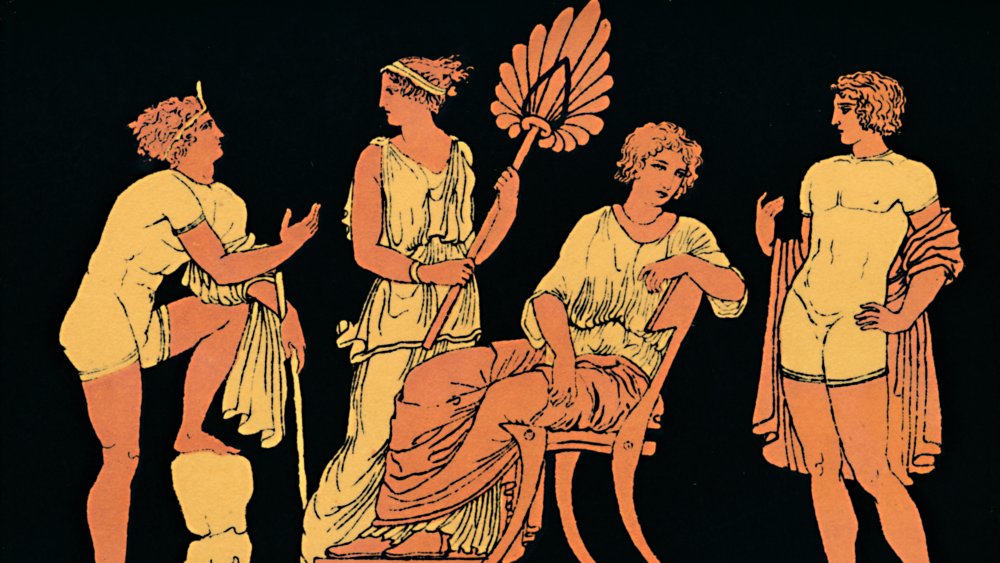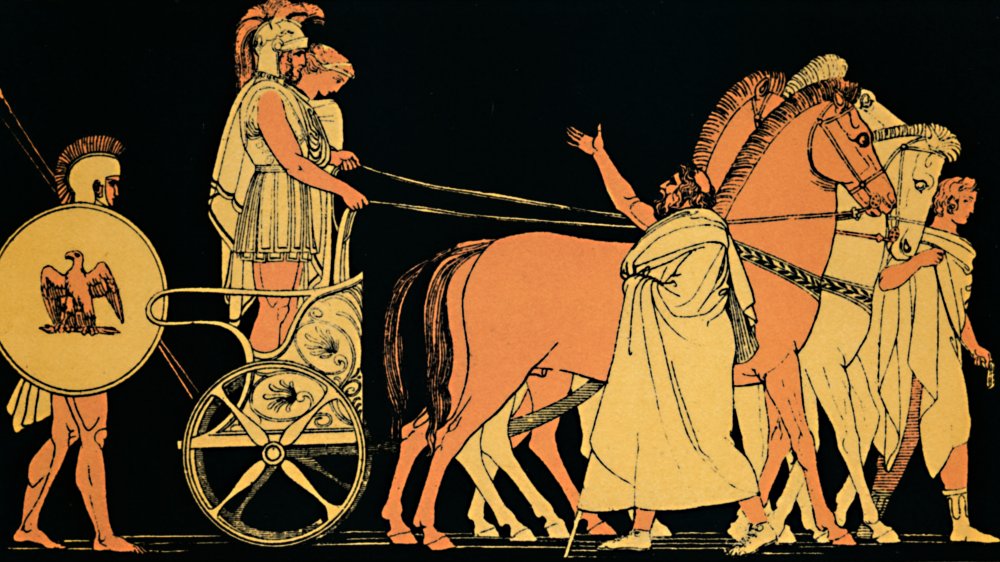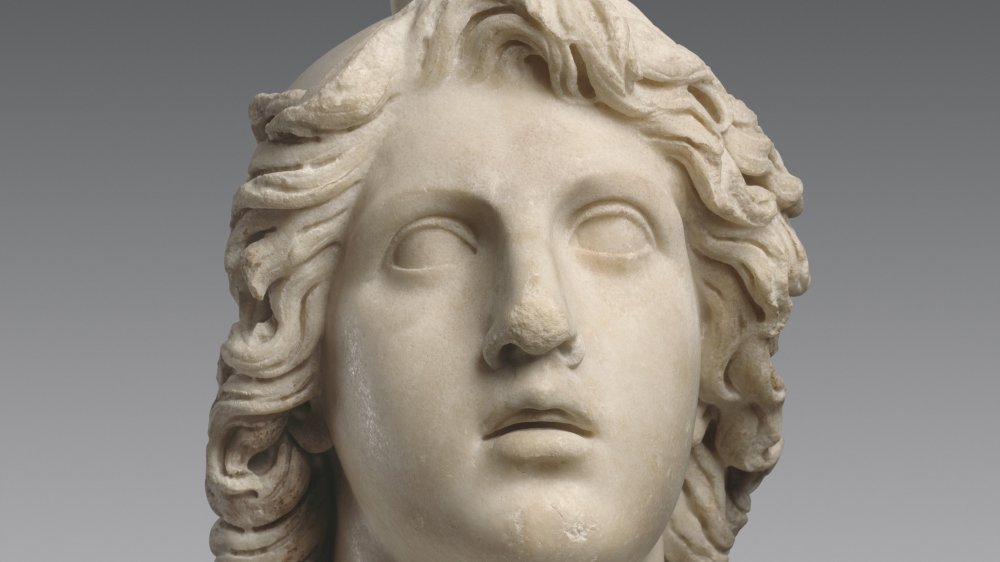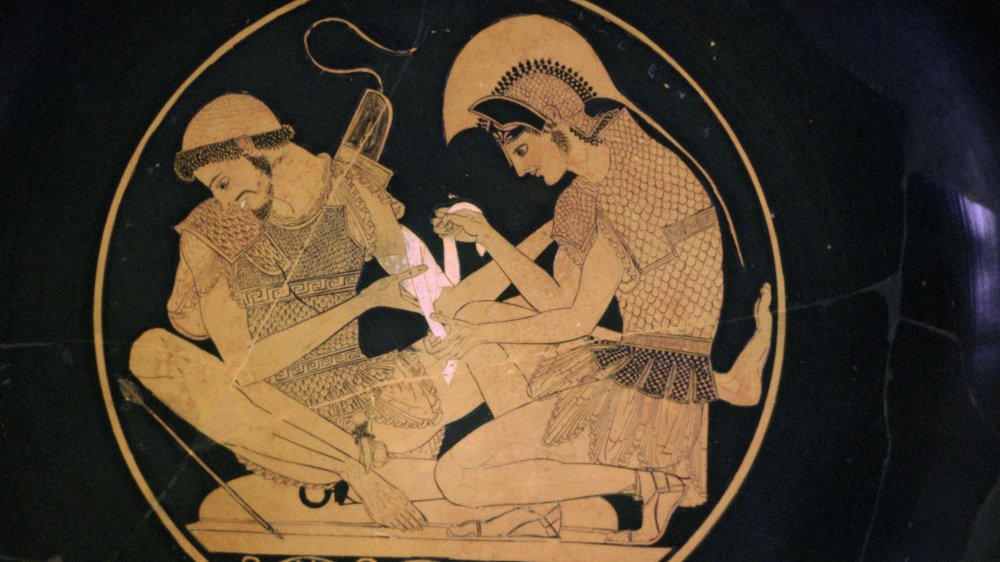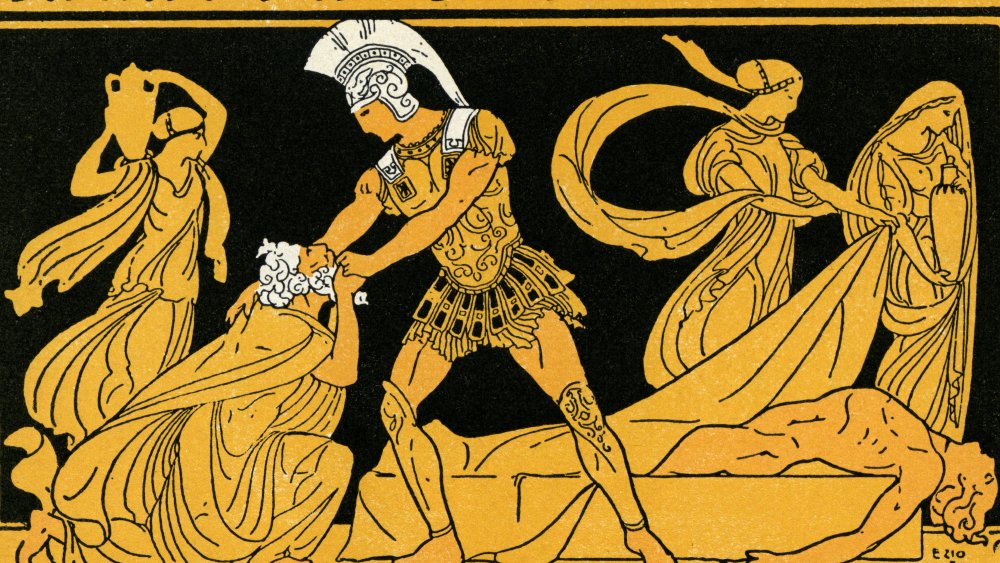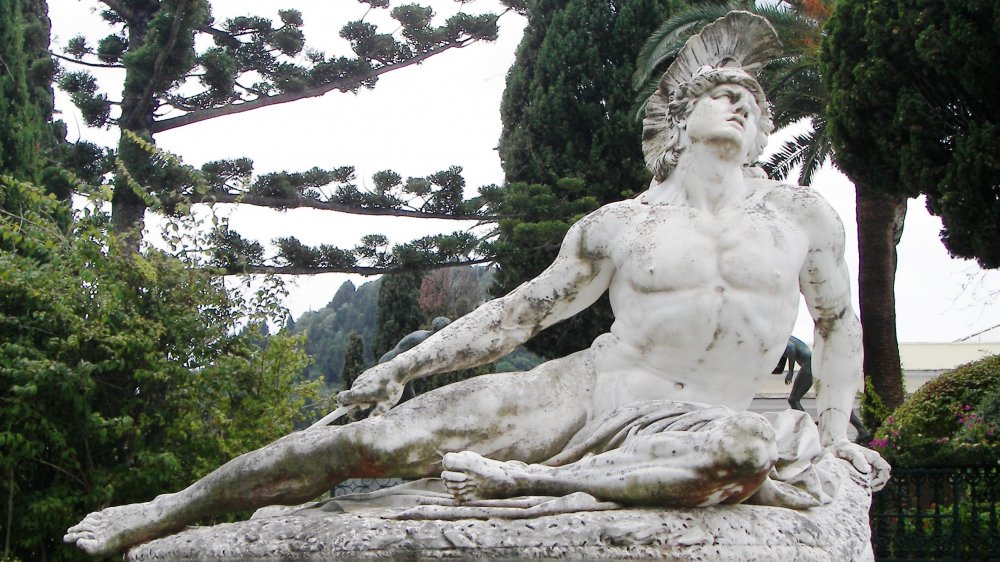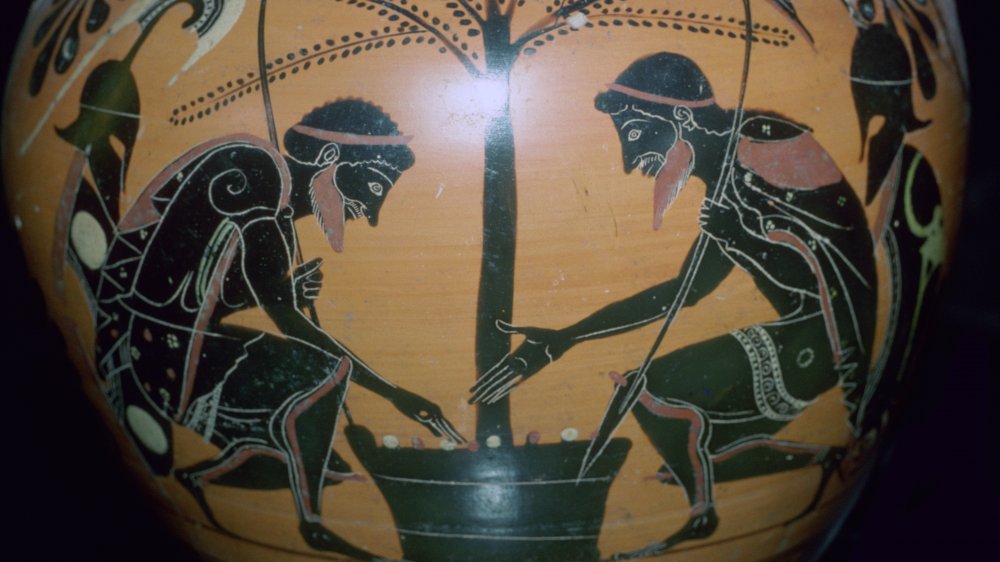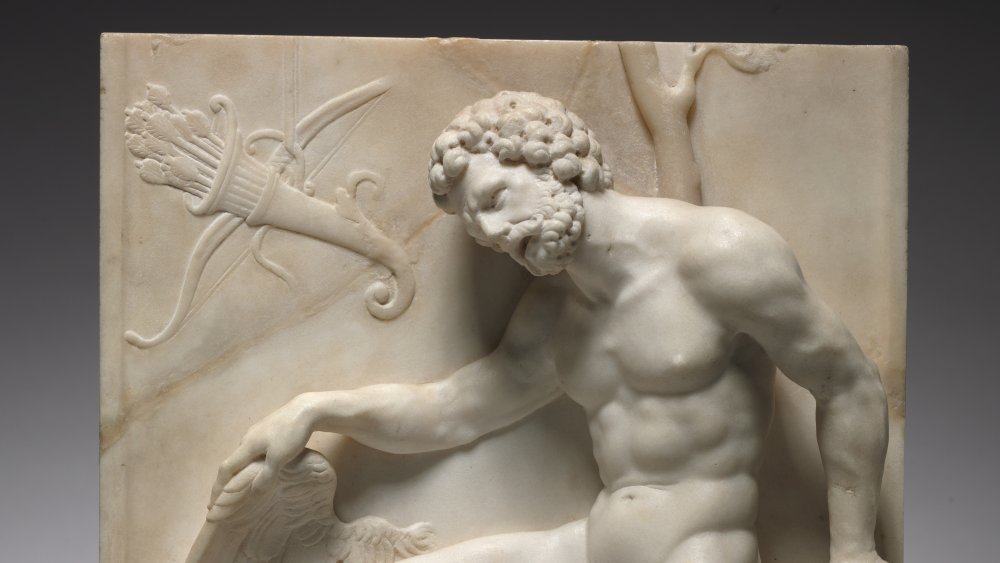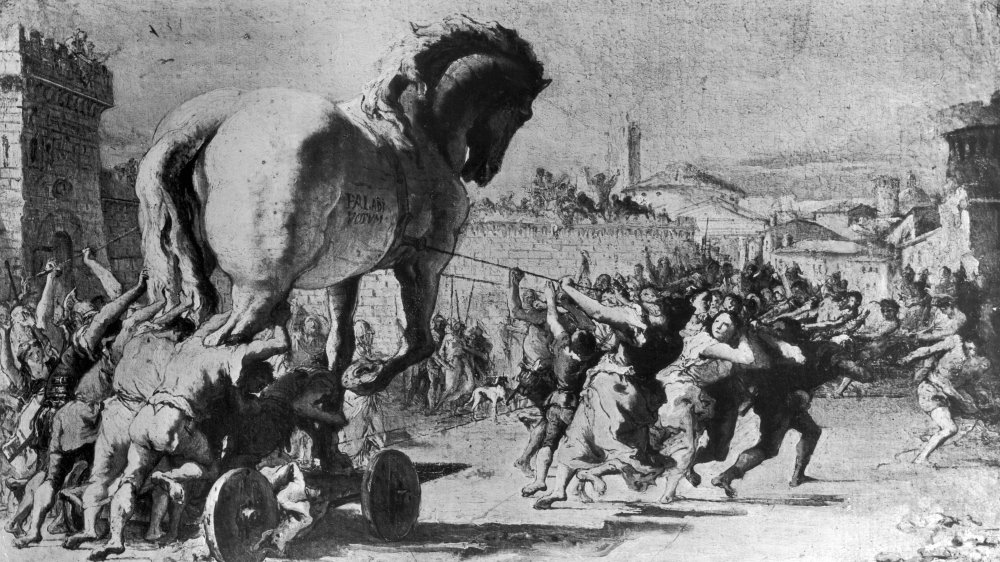The Trojan War Finally Explained
The Trojan War is possibly one of the most narrated conflicts in history. The war captured ancient Greeks' imaginations through Homer's Iliad and Odyssey, found reproduction in Virgil's Aeneid, and is repeatedly reinvented through modern retellings such as Margaret Atwood's The Penelopiad.
The first Greek historian to recount the Trojan War was Herodotus, though he also happens to be the first Greek historian whose work survives. However, Herodotus notes in his Histories that, "I myself have no intention of affirming that these events occurred thus or otherwise."
Homer's iteration of the war captivated generations by interweaving existing Greek mythology with the origin story of the battle. But even Homer wrote his account roughly around 750 B.C., and many historians believe that the Trojan War occurred around the 12th century B.C. As a result, the war's origin story resides in the space between fact and fiction, and the mythological occupies as much of a space as the historical. This is the Trojan War finally explained.
So, how historical is the Trojan War?
The story of the Trojan War has been written and rewritten by countless authors, ranging from Homer to Louis MacNeice. However, the historicity of the war wasn't always accepted as fact. During the 17th century, Blaise Pascal wrote that, "Homer produced a story, which he offered as such and was accepted as such: for no one doubted that Troy and Agamemnon had existed any more than the golden apple. He did not think he was making a history of it, merely an entertainment."
But according to the BBC, there is more truth to Homer's tale than initially thought. In the 19th century, a Prussian businessman named Heinrich Schliemann went to what is now Turkey in an attempt to find the location of the Trojan War. In his excavations at Hisarlik, he found numerous archaeological treasures that corresponded to the correct location, if not the correct time period, of Troy. And according to Nature, modern archaeologists later confirmed that the finds at Hisarlik correlated with the existence of a city as well as its destruction, demonstrative of the fact that despite his embellishments, Homer knew his history.
Ultimately, this is what truly makes Homer a writer beyond compare. He was able to take an extant conflict and the universality of warfare and transform it into a timeless tale of life and death.
Beauty contests never end well
In Greek mythology, the Trojan War basically begins with a botched beauty contest. According to the Theoi Project, all the Greek gods except for Eris, who had not been invited, were attending the wedding of Peleus and Thetis. Eris inevitably showed up regardless, and when she was turned away, she threw a golden apple into the crowd of goddesses, claiming that it would go "To the fairest."
Hera, Aphrodite, and Athena all wanted the apple. But when they asked Zeus to mediate, he delegated the task to Paris of Troy and told Hermes to take the goddesses to him. According to Greek Legends and Myth, Paris was known for making fair decisions, having previously judged a contest between a bull of Ares and a bull of his father's, King Priam, acknowledging without bias that the bull of Ares was far superior.
Hera promised Paris untold wealth and power, Athena promised untold knowledge, and Aphrodite promised Paris marriage to the most beautiful mortal woman, Helen of Sparta, who was said to be the one of the daughters of Zeus and Leda. Paris, clearly swayed by Aphrodite's promise, chose her as the fairest and rightful recipient of the golden apple. Surprisingly, despite its importance, the Judgement of Paris is only mentioned explicitly once in Homer's Iliad, in the final book of the poem.
Consensual elopement?
Since Paris had chosen Aphrodite as the recipient of the apple, Aphrodite now had to deliver the prize of Helen to Paris. Helen, of course, had no idea that she was part of such a wager, and at the time, she was happily minding her own business being married to Menelaus.
According to The Guardian, when Paris arrived in Sparta to claim Helen as his wife, Aphrodite came with him and whispered sweet nothings into Helen's ear, filling her with desire for Paris. Some consider Helen to be a passive figure, merely whisked away by Paris' libido, while others consider her flight an active betrayal of Menelaus. But Helen's motivations are ambiguous, and depending on the story, her level of participation varies, even up to the fall of Troy.
When Paris returned to Troy with Helen, his parents berated him, but he cared little now that he had the most beautiful woman in the world in his grasp. Despite the fact that Helen of Sparta may not have been real, according to the BBC, from the moment that Homer told her story, she has enthralled readers and writers alike, finding frequent representation in verbal as well as visual art.
Why fight the battles of others?
When he found out that his wife had been kidnapped, Menelaus immediately tried to get her back. He first appealed to his brother Agamemnon, and the two attempted to get Helen back through diplomatic means. When that failed, Menelaus invoked the Oath of Tyndareus.
According to Greek Legends and Myths, the Oath of Tyndareus was made during the courtship of Helen. King Tyndareus had been unable to choose a suitor for Helen, realizing that to pick one over another would inevitably lead to bloodshed. Odysseus, as one of the suitors, came up with a compromise. Odysseus suggested that the king should get an oath from each suitor that no matter who was chosen, they would swear to defend and protect Helen's husband. Thus, when Menelaus called for aid to embark on a military retrieval of Helen, the suitors, bound by the oath, were sworn to help.
But initially, not all the suitors came to Menelaus' aid willingly. Achilles' mother, Thetis, knew that her son was destined to die in battle against Troy, and in an attempt to save his life, she dressed him as a woman and sent him to live on the island of Skyros with the daughters of King Lycomedes. And according to the Ancient History Encyclopedia, even Odysseus, the author of the oath, tried to avoid the expedition by pretending to have gone mad. But ultimately, both of their ruses were discovered, and they were forced to honor their oaths.
Sacrifice a daughter to retrieve a wife
With the Oath of Tyndareus in effect, Agamemnon gathered the Achaean army at Aulis roughly two years after the abduction of Helen. When the Achaens first set out for Troy, they went the wrong way and accidentally landed in Mysia.
While they were in Mysia, they were defeated in battle against King Telephus and returned back to Aulis. However, at Mysia, Achilles wounded King Telephus during the bloodshed, and because of this wound, Telephus sought out Achilles in Aulis several years later, promising to give the Achaens directions to Troy in return for curing his wound. Though Telephus sent the Achaens in the right direction, winds once more scattered the fleets, pushing them to return to Aulis once more.
According to Rebus Community, after this second attempt to set sail failed, the seer Calchas informed Agamemnon that he'd angered the goddess Artemis by boasting about his hunting ability. He also told Agamemnon that the only way to remedy the situation and bring back favorable wind conditions was by sacrificing one of his daughters to Artemis. Seeing no other way to make it to Troy, Agamemon sent for his daughter Iphigenia. Lying to his wife, Clytemnestra, he pretended as though Achilles planned on marrying Iphigenia before setting off for Troy. While the sacrifice worked and the winds became favorable enough to get them to Troy, Clytemnestra never forgave her husband for his betrayal.
Nine years of siege
The first nine years of the war were a constant siege against the city of Troy, but the city walls kept the Achaeans at bay. According to Stories Preschool, there are few sources that talk specifically about the first nine years of the war, preferring instead to focus on the climactic events of the tenth and final year. But during this time, it's known that the Trojans defended themselves while the Achaeans sacked the neighboring cities.
Among the cities that were sacked were Thebe and Lyrnessus. According to Greek Mythology Links, these cities are not known for their strategic value but instead because they're where Agamemnon captured Chryseis and where Achilles captured Briseis, respectively. Agamemnon wanted to keep Chryseis as a prize, but her father Chryses, a priest of Apollo, offered Agamemnon a ransom for his daughter.
After Agamemnon denied Chryses' request, Chryses prayed to Apollo, who swiftly sent a plague that decimated the Achaean army. The seer Calchas informed the army that Agamemnon's refusal to return Chryseis had angered Apollo. As a result, Agamemnon begrudgingly gave up Chryseis, though he decided that if he couldn't find a replacement, then he would simply take the prize of another.
Always fighting over women
Greatly irritated by Agamemnon's threat of taking the prize of another, Achilles accused Agamemnon of being shameless. Agamemnon responded in turn by taking Achilles' prize Briseis to teach him a lesson in authority and power.
According to The British Museum, this act infuriated Achilles so much that he decided to withdraw himself and his troops entirely from battle. Meanwhile, Achilles' mother, Thetis, asked Zeus to allow the Trojans to win for a little bit in order to demonstrate to Agamemnon that victory was impossible without Achilles. According to the University of Dallas, Achilles himself may have asked his mother to make such a request so that Agamemnon might immediately feel the sharp regret of losing Achilles.
As the Trojan forces pushed back against the Achaeans, Agamemnon decided to send Ajax, Odusseus, and Phoenix to Achilles in order to beg him to return to battle. But by this point, Achilles' pride has been hurt too greatly, and he refused to rejoin the battle, even when told that Agamemnon would return Briseis along with a reward.
Who lies behind the armor?
Despite the fact that he didn't want to fight, Achilles was worried that the Achaeans might actually lose against the Trojans. Because of this, when Achilles' friend Patroclus asked if he could borrow his armor, Achilles agreed. According to The British Museum, Patroclus wanted to bear Achilles' armor in order to intimidate the Trojans as well as motivate the Achaean troops.
According to the Ancient History Encyclopedia, while Achilles allowed Patroclus to wear his armor, Achilles warned him not to go to the walls of Troy and to only push back the Trojans from the Achaean camps. Agreeing to mind Achilles' warning, Patroclus set off to lead the Achaean troops.
Initially, Patroclus did remarkably well, pushing back the Trojans and killing the Trojan hero Sarpedon. But, drunk on his success, he forgot about his promise to Achilles and went on fighting toward the walls of Troy. It was at this point that Apollo once again attacked the Achaean army, shattering Patroclus' spear and breaking the armor off of him. Exposed, Patroclus was brought to his end by Hector.
The rage of war
Enraged at the news of his friend's death, Achilles decided to rejoin the Trojan War. According to Homer's Iliad, Achilles compared the loss of Patroclus to the loss of a father or a son. And upon rejoining the battle, he immediately sought Hector out for vengeance. According to the Law and Religion Forum, Hector's mother knew that her son was going to be killed by Achilles and implored him to retreat to safety. But Hector feared shame more than he feared death and instead went out to confront Achilles head-on.
Upon meeting Achilles, Hector tried to get him to agree that no matter who wins, they will not desecrate the defeated man's body, for this is what his mother warned would occur. But Achilles' rage had given him tunnel vision, and he had no regard for fairness. He only wanted to see the annihilation and obliteration of his enemy. Achilles promptly slayed Hector, and after stringing rope through Hector's Achilles tendons, he tied the dead body to his chariot and pulled it back to the Achaean camp, dragging it around Patroclus' funeral pyre 12 times.
Despite the death and desecration of Hector's body, Achilles' rage still wasn't sated, and he continued to abuse the body. By this point, the gods started to feel pity for Hector, and Apollo intervened once more to protect the body until Priam recovered it for a burial.
The death of Achilles
After Hector's death, the Trojans called upon their allies for support now that their best fighter was dead. King Memnon of Ethiopia came with his troops, but Achilles swiftly slayed him in battle as well. The Amazons, a band of female warriors, also came in support of the Trojans. According to The British Museum, Achilles fought with the Amazon's leader, Queen Penthesilea, and while he also killed her, at the moment he did, their eyes met, and he fell in love with her. Alas, too late.
After watching Achilles lay waste to the Trojan allies, the gods decided that enough was enough. At Aphrodite's behest, Apollo guided an arrow shot by Paris directly into Achilles' heel. According to Encyclopedia Britannica, Achilles' heel was his only vulnerable part, since when his mother had dipped Achilles into the River Styx, she hadn't dipped the part of the heel by which she was holding him, thus leaving him invulnerable except for one heel.
Aphrodite held a special place for Paris in her heart, and having given him the most beautiful woman in the world, she now gave him the gift of killing the greatest Greek warrior. But, according to The Guardian, with this act, Aphrodite decided that she no longer owed anything to Paris. As a result, when he went to Helen that night, bragging about defeating Achilles, Aphrodite's spell over Helen had come to an end, and she no longer felt any desire for him.
All for the sake of appearances
After Achilles was shot and killed, there was a huge fight for his dead body. Ajax and Odysseus managed to return the body to the Achaean ships, where Achilles was cremated, his ashes mixed with the ashes of Patroclus.
With Achilles dead, the Achaeans argued over who would wear his armor since it was made by Hephaestus, the Greek god known for his metalwork. According to ThoughtCo, the Achaeans thought that Achilles' armor should go to the hero who was comparable to his greatness. Odysseus and Ajax both claimed the armor, but instead of fighting for it, Odysseus suggested letting the kings decide. According to the University of Dallas, as Odysseus and Ajax spoke before the kings, Odysseus was more rhetorically skilled and convinced the kings to give Achilles' armor to him. But despite his victory, he ended up giving the armor to Achilles' son, Neoptolemus.
Fleeing the Achaean camps in anger, Ajax started to plot his revenge. In the middle of the night, he snuck back and began to kill every Achaean he could. But the goddess Athena had sent Ajax into madness, and in his madness, he was slaughtering livestock instead of Achaeans. In the morning, he gloated briefly until he realized what he had done. Feeling distraught and disgraced, Ajax killed himself by falling upon his own sword.
The prophecy of the arrows
After Achilles was killed, the seer Calchas informed the Achaeans of another prophecy that stated that they needed the bow and arrows of Hercules in order to defeat the Trojans. Unfortunately, according to ThoughtCo, the arrows had been left with Philoctetes (depicted above), whom the Achaens had left behind on the island of Lemnos on their way to Troy.
Now knowing that the arrows of Hercules were essential to their victory, the Achaens promptly sent out an envoy to retrieve Philoctetes and the arrows. Philoctetes was still wounded, but once he got to the Achaean camps, he was quickly healed by one of the sons of Asclepius. Once healed, he went out into the battlefield and shot one of the arrows at Paris. Even though the arrow barely scratched Paris, similar to the arrow that struck Achilles' heel, as Calchas prophesied, the arrows were of essential importance, and the slight wound was enough to kill Paris.
The Trojan Horse
In the final phase of the war, Odysseus came up with his infamous plan of the Trojan Horse. According to The Guardian, the Achaeans captured Priam's son, Helenus the seer, who told them that because the walls of Troy had been built by Poseidon, they could never be breached. In light of this, the Achaeans devised the devious plan.
According to the Ancient History Encyclopedia, the Achaeans made it seem as though they were leaving and sailing off, leaving a giant wooden horse. In fact, the Achaeans hid themselves within the giant horse and waited for the curious Trojans to bring the massive wooden equine into the city walls. They made sure that the warrior Sinon also stayed behind to tell the Trojans that the Achaeans had decided to give up and leave the Trojans a present. The Trojans fell for the tale and brought the horse inside the city walls. That night, as the Trojans drank and celebrated their victory, the Achaeans climbed out of the giant wooden horse and sacked the city.
The Achaeans were cruel in their victory as they pillaged the city, committing sacrilegious acts. Out of the Trojan heroes, only Aeneas was able to escape while everyone else was murdered or enslaved. In response to the Achaeans' horrendous behavior, the gods sent down punishment storms to destroy the Achaeans' ships. Those who were able to return faced a perilous and difficult journey, like Odysseus, whose 10-year trip home is also narrated by Homer in the Odyssey.
